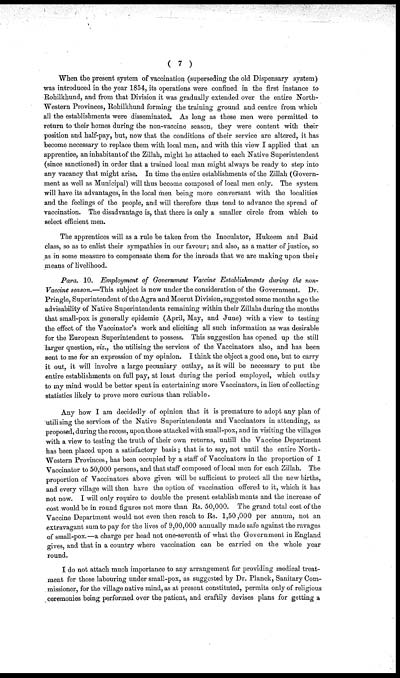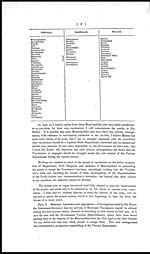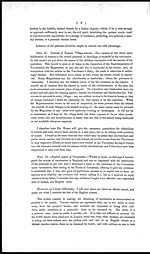Medicine - Vaccination > 1866-1901 - Annual report upon vaccination in the North-Western Provinces > Vaccination North-Western Provinces 1866-1877 > 1871-1872 - North-Western Provinces. Returns of vaccination for the season of 1871-72
(129) Page 7
Download files
Individual page:
Thumbnail gallery: Grid view | List view

( 7 )
When the present system of vaccination (superseding the old Dispensary system)
was introduced in the year 1854, its operations were confined in the first instance to
Rohilkhund, and from that Division it was gradually extended over the entire North-
Western Provinces, Rohilkhund forming the training ground and centre from which
all the establishments were disseminated. As long as these men were permitted to
return to their homes during the non-vaccine season, they were content with their
position and half-pay, but, now that the conditions of their service are altered, it has
become necessary to replace them with local men, and with this view I applied that an
apprentice, an inhabitant of the Zillah, might he attached to each Native Superintendent
(since sanctioned) in order that a trained local man might always be ready to step into
any vacancy that might arise. In time the entire establishments of the Zillah (Govern-
ment as well as Municipal) will thus become composed of local men only. The system
will have its advantages, in the local men being more conversant with the localities
and the feelings of the people, and will therefore thus tend to advance the spread of
vaccination. The disadvantage is, that there is only a smaller circle from which to
select efficient men.
The apprentices will as a rule be taken from the Inoculator, Hukeem and Baid
class, so as to enlist their sympathies in our favour; and also, as a matter of justice, so
as in some measure to compensate them for the inroads that we are making upon their
means of livelihood.
Para. 10. Employment of Government Vaccine Establishments during the non-
Vaccine season.—This subject is now under the consideration of the Government. Dr.
Pringle, Superintendent of the Agra and Meerut Division, suggested some months ago the
advisability of Native Superintendents remaining within their Zillahs during the months
that small-pox is generally epidemic (April, May, and June) with a view to testing
the effect of the Vaccinator's work and eliciting all such information as was desirable
for the European Superintendent to possess. This suggestion has opened up the still
larger question, viz., the utilising the services of the Vaccinators also, and has been
sent to me for an expression of my opinion. I think the object a good one, but to carry
it out, it will involve a large pecuniary outlay, as it will be necessary to put the
entire establishments on full pay, at least during the period employed, which outlay
to my mind would be better spent in entertaining more Vaccinators, in lieu of collecting
statistics likely to prove more curious than reliable.
Any how I am decidedly of opinion that it is premature to adopt any plan of
utilising the services of the Native Superintendents and Vaccinators in attending, as
proposed, during the recess, upon those attacked with small-pox, and in visiting the villages
with a view to testing the truth of their own returns, untill the Vaccine Department
has been placed upon a satisfactory basis; that is to say, not until the entire North-
Western Provinces, has been occupied by a staff of Vaccinators in the proportion of 1
Vaccinator to 50,000 persons, and that staff composed of local men for each Zillah. The
proportion of Vaccinators above given will be sufficient to protect all the new births,
and every village will then have the option of vaccination offered to it, which it has
not now. I will only require to double the present establishments and the increase of
cost would be in round figures not more than Rs. 50,000. The grand total cost of the
Vaccine Department would not even then reach to Rs. 1,50,000 per annum, not an
extravagant sum to pay for the lives of 9,00,000 annually made safe against the ravages
of small-pox.—a charge per head not one-seventh of what the Government in England
gives, and that in a country where vaccination can be carried on the whole year
round.
I do not attach much importance to any arrangement for providing medical treat-
ment for those labouring under small-pox, as suggested by Dr. Planck, Sanitary Com-
missioner, for the village native mind, as at present constituted, permits only of religious
ceremonies being performed over the patient, and craftily devises plans for getting a
Set display mode to: Large image | Zoom image | Transcription
Images and transcriptions on this page, including medium image downloads, may be used under the Creative Commons Attribution 4.0 International Licence unless otherwise stated. ![]()
| Permanent URL | https://digital.nls.uk/87224466 |
|---|
| Attribution and copyright: |
|
|---|




